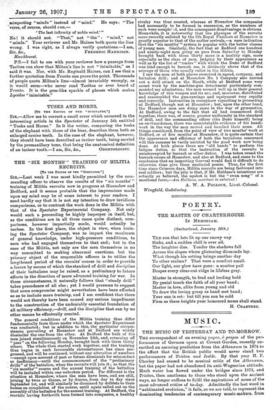THE "SIX MONTHS' " TRAINING OF MILITIA RECRUITS.
[To THY EDITOR 07 THZ .SPEC7A708.1 S,—Last week I was most kindly permitted by the com- manding officer to observe the results of the "six months'" training of Militia recruits now in progress at Hounslow and Bedford, and it seems probable that the impressions made upon my mind may be of some interest to your readers. I need hardly say that it is not my intention to draw invidious comparisons, or to contrast the work done in the Militia with that of the Spectator Experimental Company. Not only would such a proceeding be highly improper in itself, but, as the conditions are in all three cases quite distinct, com- parisons, however impartially made, would actually be useless. In the first place, the object in view, when train- ing the Spectator Company, was to impart the maximum of general knowledge, under high-pressure conditions, to men who had engaged themselves to that end; but in the case of the Militia, not only are the men themselves in no way committed to making abnormal exertions, but the • primary object of the responsible officers is to utilise the lengthened period of the recruits' course in order to provide a lateen by means of which the standard of drill and discipline of their battalions may be raised, as a preliminary to future efforts in the direction of more advanced training for war. In these circumstances, it naturally follows that "steady drill" takes precedence of all else ; yet I would presume to suggest that some compromise might nevertheless have been effected so as to include more training, and I am confident that there would not thereby have been caused any serious impediment to the construction of the undeniably essential foundation of all military efficiency,—draL and the discipline that can by no other means be effectually created.
The general conditions of the Militia training thus differ fundamentally from those under which the Spectator Experiment was conducted; but in addition to this, the particular circum- stances • prevailing at Hounslow and at Bedford are widely dissimilar the one from the other. At Bedford the bulk of the men joined simultaneously on November 12th, and, returning off "pass" on the following Monday, brought back with them thirty others. The whole then started work together, and the training thus begun in such favourable circumstances has since pro- gressed, and will be continued, without any alteration of numbers —except upon account of past or future dismissals for misconduct or inefficiency—until the commencement of the "preliminary drilla" of the battalion, when the recruits will join it ; so that the "six 'months" course and the annual training of the battalion will be included within one unbroken period. Far different is the situation at Hounslow, where the men have been, and are still, joining by twos or threes, or by dozens, from day to day since September 1st, and will similarly be dismissed by driblets to their homes on completion of the course, until again called out on the assembly of the battalion for the annual training. At Bedford, the recruits having forthwith been formed into companies, a healthy riialry was thui created, whereas at Hounslow the companies had necessarily to be formed in succession, as the numbers of eaoh were complet xl, and the consequent disadvantage is obvious. Meanwhile, it is noteworthy that the physique of the recruits more recently enlisted by the 7th Royal Fusiliers at Hounslow is greatly superior to that of the earlier arrivele,—a sure indication that the "six months" system is popular with the better classes of young men. Similarly, the fact that at Bedford one hundred and ninety-eight men going on pass from Saturday to Monday brought back with them thirty more is a healthy sign, more especially as the class of men, judging by their appearance as well as by the list of " trades " with which the Duke of Bedford WAS kind enough to furnish me, is distinctly above that of the average of those who usually enlist in the Militia.
I saw the men at both places exercised in squad, company, and battalion drill; and at Hounslow No. 1 Company also carried out a drill attack on the Heath, while at Bedford some very smart work by the machine-gun detachment particularly com- manded my admiration ; the men seemed well up in their general knowledge of this weapon and its use, and, moreover, distributed and reassembled the gun-carriage and equipment very rapidly and correctly. Instruction in semaphore signalling is proceeding at Bedford, though not at Hounslow ; but, upon the other hand, the Hounslow men are doing more in the way of gymnastics. At Bedford, owing to the fact that all had commenced drill together, there was, of course, greater uniformity in the standard of drill, and the commanding officer (the Duke himself) being an ex-Guardsman, there was unmistakable evidence of his handi- work in the way the men moved and handled their arms. All things considered, from the point of view of two months' work at Bedford, or of five months' at Hounslow, it is quite certain that the appearance and efficiency of both the battalions concerned will this summer be vastly assisted by the good work now being done. At both places there are "old hands" to perform the fatigue duties, so that the instruction of the recruits is uninterrupted by barrack or other duties. I was taken round the barrack-rooms at Hounslow, and also at Bedford, and.came to the conclusion that an inspecting General would find it difficult to do otherwise than give them unstinted praise. Thus, for the first time since Crimean days, Militia recruits are being fashioned into real soldiers ; but the pity is that, if Mr. Haldane's intentions are actually as believed, the upshot is but the "swan song" of a moribund force,—.Ave Hoideue, morituri is scautant !






















































 Previous page
Previous page